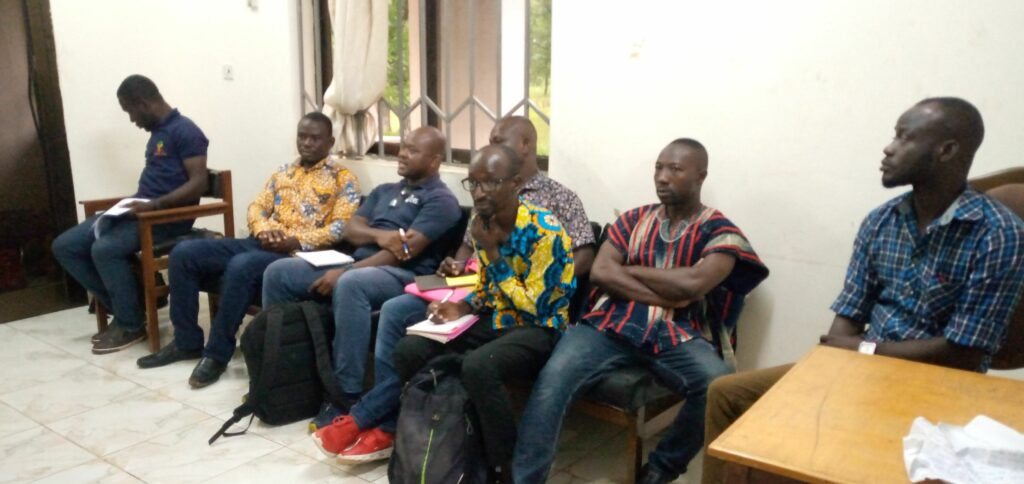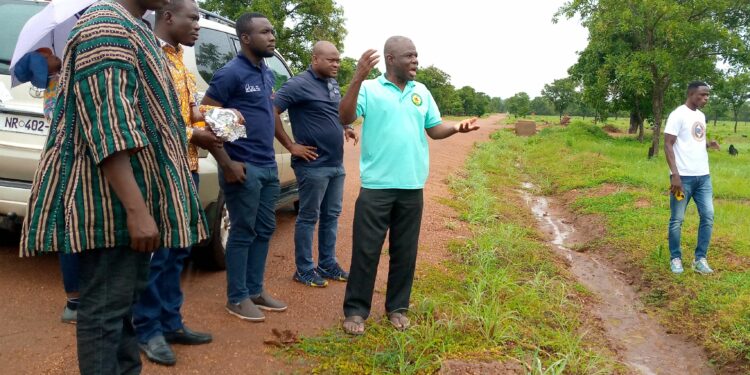
The Environmental Working Group from the West Gonja municipality in the Savannah region of Ghana has paid a working visit to the Cocoa Research Institute at Bole to acquaint themselves with processes and practices at the institute to help the enhancement of agricultural land restoration towards food security. This visit, which took place on Friday, 19th August, 2022, has objectives of helping to improve farming practices that will lead to proper food security and good environmental practices in the area.

Philip Atim, Enhance Project Manager, for Catholic Relief Services (CRS) together with West Gonja municipal environmental working group members visited the Bole based Cocoa Institute of Ghana (CRIG) to interact with the officers of the CRIG on ways to help fight against food insecurity and bad agricultural land restoration practices.
Philip Atim explained the purpose of the visit was for group members to gain necessary skills to help increase food security and climate variability resilience of farmer house holds by scaling up re-greening practices. This will be done through enhancing coordination and institutional networking of land restoration actors.
Philip Atim further called for stronger institutional partnership to help the project execute it’s core objectives and disclosed the readiness of the group to abide by laid down regulations to execute it’s mandate.
Dr Yaboah, the CRIG team leader lauded the idea and expressed gratitude to the environmental working group and CRS for the visit.
Dr Yaboah said grafted shea seedlings is one of the best practices to get shea trees fruit early. The trees could start fruiting within three (3) after planting. Farmers can plant these seedlings and still do their farming activities.
This will lead to enhancing farmer income and financial independence.
Dr Yaboah assured that CRIG is ready to work or partner with the group to succeed and said his outfit will help train group members the practical ways of grafting, to aid the group to practically monitor grafted seedlings from scratch till maturity.
Sumani Iddrisu (Azambuja), Founder and Chief Executive Officer of Bunyanso Farms Ltd
and member of West Gonja Municipal Environmental Working Group admonished group members to do whatever is humanly possible to assist the project achieve it’s objectives. He said various assemblies in the Savannah region need shea nursery sites for farmers to establish shea plantations for their livelihood.
He also emphasized development of cashew in the area of improved high yielding grafted cashew seedlings distribution to farmers, improved cashew production, raw cashew and cashew apple processing facilities and storage facilities to cashew farmers can increase job creation, wealth creation, environmental conservation and poverty reduction in the Savannah Region.
Umar Husein, a deputy planning officer with the West Gonja municipal assembly said the assembly will assist the group to help the chiefs and people of the area own the project in order to ensure its success. He added that issues of bush fires, community owning the project and others should be of great concern to all and sundry.

Staff from CRS, department of agriculture, community development, National disaster management organization, hon assembly members among others were part of the trip.
Akwasi Ezekiel from department of agriculture, West Gonja municipality and staff of the department lead the West Gonja municipal group.

ENHANCING AGRICULTURAL LAND RESTORATION (ENHANCE)
This project will be implemented from February to September 2022 in two main districts or municipalities (West Mamprusi and West Gonja) with the overall goal to increased food security and climate variability resilience of farmer House Holds (HHs) by scaled up regreening practices. It will be implemented side-by -side with the Ghana Private Agricultural Service Providers Network project (PASP) in the same district.
The project seeks to achieve this through Enhancing coordination and institutional networking of land restoration actors, where two (2) Environmental working groups will be formed and functioning by September 2022, working and providing advise to the district assemblies on degradation issues.
Enhancing partners and stakeholders access to restoration data scaling up regreening practices and technologies among farmer House Holds with a target of about 3000 (1500 in each district) Households covered, 1000 hectares of degraded lands (500 in each district), restored 15 Agriculture Extension Agents (7 in each district), trained 90 Lead farmers (45 in each district), trained 20 communities (10 in each district), covered 1 Environmental working group formed in each district.
The project will employ trainings to enhance beneficiaries’ knowledge, On field demonstrations, workshops, exchange visits, community fora, videos and radios will also be used to disseminate technologies and results.
Community nurseries and Farmer-Managed Natural Regeration (FMNR) hubs will be established and used as training centers for training farmers.
The project will help increase awareness of communities on climate change and implications on their socio-economic wellbeing.
It will also enhanced communities’ tree-based and alternative livelihoods Strengthened Natural Resource Management (NRM) governance at community and district levels. It will also increase application of knowledge and skills of applying best practices including Farmer-Managed Natural Regeration (FMNR) to restore lands.Put degraded lands under various forms of restoration.
By: @nuhuzulqa
0242381890

















